Recently, Coinsguru.org website appeared, promoting itself as a platform to keep cryptocurrency and other assets safely. I managed to gather credible evidence that unmistakably indicates it is, actually, a fraudulent site.
Regardless of the promises of the most user-friendly, reliable, and customer-centric service, Coinsguru.org does not fulfill any of them. All this is just a gilded wrap around a clear scam, which steals your money and never gives them back. Any stories about gifts, endorsement from celebrities etc are non-existent as well.
Coinsguru Scam Overview
Originally, Coinsguru poses as a crypto trading & cryptowallet platform with exceptionally low commission fees. Another notable selling point for this service is partnerships with celebrities that are known as crypto activists. Elon Musk, Bill Gates, Vitalii Buterin, Warren Buffet – the site claims having significant support from them. To make these claims look real, rascals employ deepfake videos with those celebs promote the fraud as the best thing in the world. For obvious reasons, Elon Musk is the most common among them. But, as I said in the introduction, all this is just a glaring wrap around a transparent scam.
To begin with, Coinsguru copies the layout of numerous similar online platforms. There are quite a few examples, like Selobit, Greynex or Fenulax. They are completely undistinguishable in terms of graphic elements, with small discrepancies in the website header. Other particulars, and at times even crypto wallet addresses, are unchanged. Probably, all these deceptive websites are led by a single team of swindrels.
Cryptocurrency Scam Summary
| Website | Coinsguru.org |
| Hosting | AS13335 Cloudflare, Inc. United States, San Francisco |
| IP Address | 104.21.68.114 |
| Threat Type | Scam/Fraud |
| Scam Type | Fraudulent offers of cryptocurrency services |
How the Coinsguru Scam Works?
Coinsguru is a part of a significant cryptocurrency scam scheme that started circulating actively in 2023. Scammers who stand behind it use numerous website designs, which still share the similar overall layout. Another mutual element are the ways the scams like NAME are promoted, and the manner all this ends up to the victim of the scam. To reach peak efficiency, frauds apply advanced psychological tricks that make the user believe in the authenticity of the website. But let’s review them one by one.
Step 1: Promotion
To initiate the deceptive scheme, criminals create and fill accounts on well-liked social media platforms. They generally focus on Facebook, Instagram, Twitter, and TikTok. Subsequently, the promotional campaign commences. Utilizing bots and sponsored ads (when feasible), scam actors intensify the presence of their scam activities to possible victims. And as I said, fraudsters do not shy away using generative AI for creating videos with the mentioned celebs that advertise their scam to the public. To boost the folks even more, deceivers claim the bonus for every user who enrolls the service immediately.

Promotions of cryptoscams like Coinsguru in TikTok. Most of these videos are AI-generated deepfakes
Users get an encouragement to enroll, attracted by the commitment of getting cryptocurrency rewards valued at thousands of dollars, all for free. To augment the attractiveness of the offer, false suggestions of cooperation with a celebrity are added. As you may guess, these claims are completely baseless.
Step 2: Gaining Traffic
Upon following the ads, victims end up on a page filled with appealing offers. “Crypto starts with Coinsguru”, “Your crypto savings are secured with Coinsguru, “Start earning with Coinsguru – they look rather authoritative. To heat up users and make them proceed to step 3, crooks say that getting the promoted bonus requires registration. And as nothing concerning happens at this point, uninformed users happily proceed – especially since the reward appears to be right behind the corner.
This is the last stage when it is possible to steer away from the scam without any losses. Before you register using your personal info, rascals will not be able to earn even a nickel from your presence on the website.
Step 3: Data Gathering
This is the starting poing of the main fraud action. As I just said, frauds bait folks into registration for bonuses. And all the personal data needed for it – email, username, cryptocurrency wallet address – are valuable for user identification. Solely by gathering this information and selling it further into the Darknet, crooks can earn quite a penny. Still, their plans go much further.
As it turns out, you cannot use the alleged bonus right away. To make at least crypto purchases on the platform with it, you need to top up the account with the sum of a bonus. And this is what initiates the final step of the scam.
Step 4: Requesting funds
It is obvious that any cryptocurrency operations require having money on your account. With Coinsguru, users are also coerced to top up to claim the bonuses. And these top ups is what creates the majority of the money flow to this fraudulent site. By topping up the account, users hope to get the committed gift (usually $500-1000 in USDT), and may start trading on this site hoping to use all the deposited capital and withdraw them.
This is where the victim notices the issues. When comparing the real cryptocurrency wallet vs what the website says, you can spot that no transactions are done whatsoever. And then, when you’d try to withdraw the funds from your account, the scam is finally uncovered to the user.
Step 5: Escaping from Funds Withdrawal
There’s no need to explain that fraudsters are naught on intentions to return your money. Though to make it look more legitimate, they’ve made up a whole pack of reasons to decline the wireout request. Usually, they repeat what Know Your Client guidelines say, but in this case they are here only to make the withdrawal impossible.
By requesting your personal data, deceivers just stall hoping for you to accept the loss and stop contacting them. If you don’t – well, there are numerous other checks you would desperately need to undergo before getting your grand back. And each of these checks will reveal more and more information, which – you guessed it right – will be then sold on the Darknet. Never reveal your real info to strangers!
Signs of Scam
I gathered several facts that point at the scammy nature of the Coinsguru.org. Actually, there are a lot of scams that fall under the same points, so they are pretty much universal.
- Cryptocurrency-Only Transactions. Coinsguru.org insists on cryptocurrency payments exclusively, excluding conventional methods like bank transfers. This strategy ensures anonymity for the scam and eliminates any possibility of seeking refunds.
- Dubious Company Credentials. Coinsguru arouses suspicion by failing to provide critical information about ownership, location, and legal registration. The lack of valid contact details and the recent creation of domain and social media profiles cast doubt on its legitimacy.
- Baseless Hype Generation. Coinsguru resorts to fabricating non-existent achievements, such as contracts with Coinbase or endorsements from Elon Musk, to manipulate emotions and enhance the perception of potential returns, enticing victims to invest more.
- Fictitious Celebrity Association. Coinsguru employs a deceptive tactic by falsely associating itself with well-known figures like Elon Musk, Jeff Bezos, Mr. Beast, and Mark Zuckerberg. Additionally, the scam falsely claims partnerships with established entities like Coinbase, Binance, or MetaMask to bolster its false credibility.
- Potential Ponzi-Like Model. The scam operates on a pyramid-style referral system disseminated through social media, benefiting only initial participants and relying on later investments to sustain the illusion.
- Unrealistic Profit Promises. Promising improbable returns of 50-100-200%, Coinsguru capitalizes on the desire for high profits. However, the tumultuous nature of the cryptocurrency market renders such gains implausible, solidifying Coinsguru.org as a definite scam.
What Should I do as a Victim?
If you had to deal with Coinsguru site and fell victim to that scam, there are still some steps to take. They will make further scam attempts harder, and also boost the knowledge about that scam among folks.
- Immediate Reporting. Your initial step should involve promptly notifying local authorities specializing in financial fraud. Extend your reach by reaching out to wallet providers and engaging with social networks’ technical support teams. These actions serve to raise the bar for the scammers’ operations.
- Share among Friends. Amplify your efforts by informing your close friends about the scam. Similar to informing authorities, this dissemination of information restricts the scammers’ potential victim pool.
- Preserve Crucial Information. Compile a comprehensive evidence archive by capturing screenshots and archiving all relevant website-related data. Collect the website URL, screenshots of the main page, login interface, end-user license agreement (EULA), account top-up menu, and wallet addresses. These records could provide vital clues for authorities in their pursuit of the scammers.
- Exploring Refund Options. While most banks’ refund policies may exclude cryptocurrency payments, it’s advisable to explore potential refund avenues under specific circumstances. Maintain hope until you obtain confirmation of the loss.
- Transform Loss into Knowledge. Turn your financial setback into an opportunity for growth. View your loss as an investment in understanding the strategies employed by crypto scam sites. Familiarize yourself with their telltale characteristics, the methods they employ to entice individuals, and the extravagant promises they make. Equipped with this insight, you’ll be well-prepared to spot and evade future traps without suffering additional financial setbacks.
Scan your system for possible malware infections
Beware of cross scams! Scam actors can use your trust to make you download some stuff or interact with certain documents. It may be a trap that installs malware to your system. There are no moral barriers or limits for these scoundrels.
Throughout the duration of the scam, fraudsters may reach out to you with particular documents. Alternatively, they may offer you to set up “cryptocurrency wallet applications” or “browser extensions” to simplify access to your crypto assets. As we already determined, these scoundrels have no plan of restoring your capital. So, what do these email messages and browser add-ons represent? Correct – that is another component of the fraudulent scheme designed to entice you into willingly installing destructive applications onto your system.
Both add-ons and attachments added to email messages can act as a shell for various malware. In this situation, I expect the presence of spyware and stealers among other forms of malware. While it is not mandatory for scammers to distribute malware, the probability is always significant. As stated, their conscience is of negligible importance, and their reputation is already seriously marred. They have no scruples to give up and aim to boost revenues.
Remove spyware with Gridinsoft Anti-Malware
We have also been using this software on our systems ever since, and it has always been successful in detecting viruses. It has blocked the most common malicious programs as shown from our tests with the software, and we assure you that it can remove spyware as well as other malware hiding on your computer.
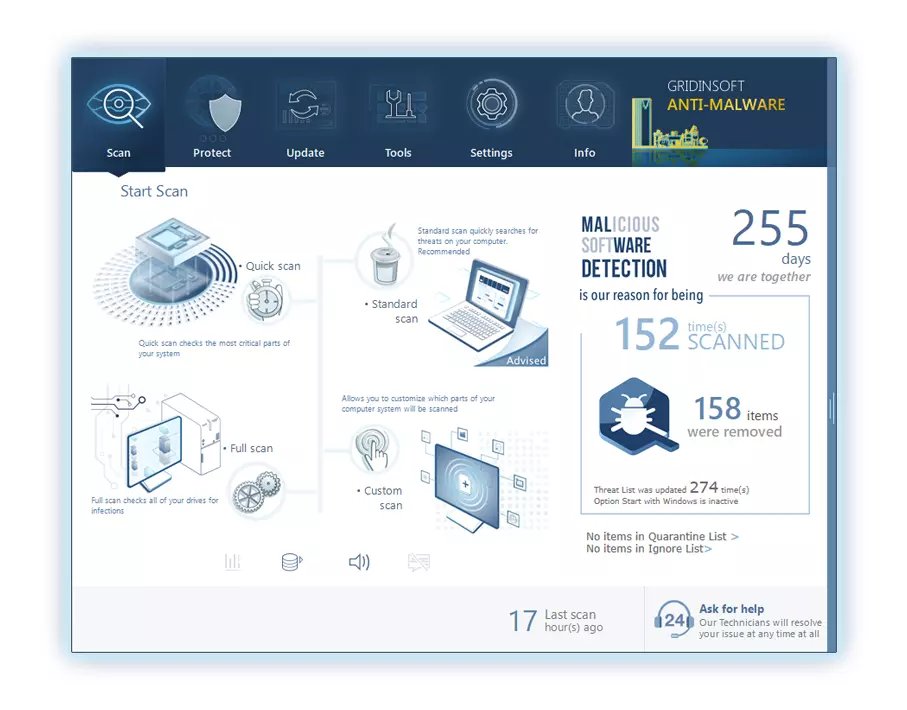
To use Gridinsoft for remove malicious threats, follow the steps below:
1. Begin by downloading Gridinsoft Anti-Malware, accessible via the blue button below or directly from the official website gridinsoft.com.
2.Once the Gridinsoft setup file (setup-gridinsoft-fix.exe) is downloaded, execute it by clicking on the file.
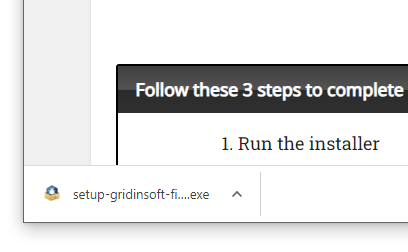
3.Follow the installation setup wizard's instructions diligently.
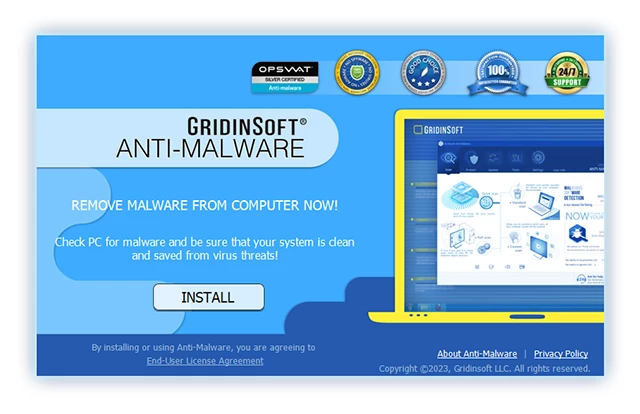
4. Access the "Scan Tab" on the application's start screen and launch a comprehensive "Full Scan" to examine your entire computer. This inclusive scan encompasses the memory, startup items, the registry, services, drivers, and all files, ensuring that it detects malware hidden in all possible locations.
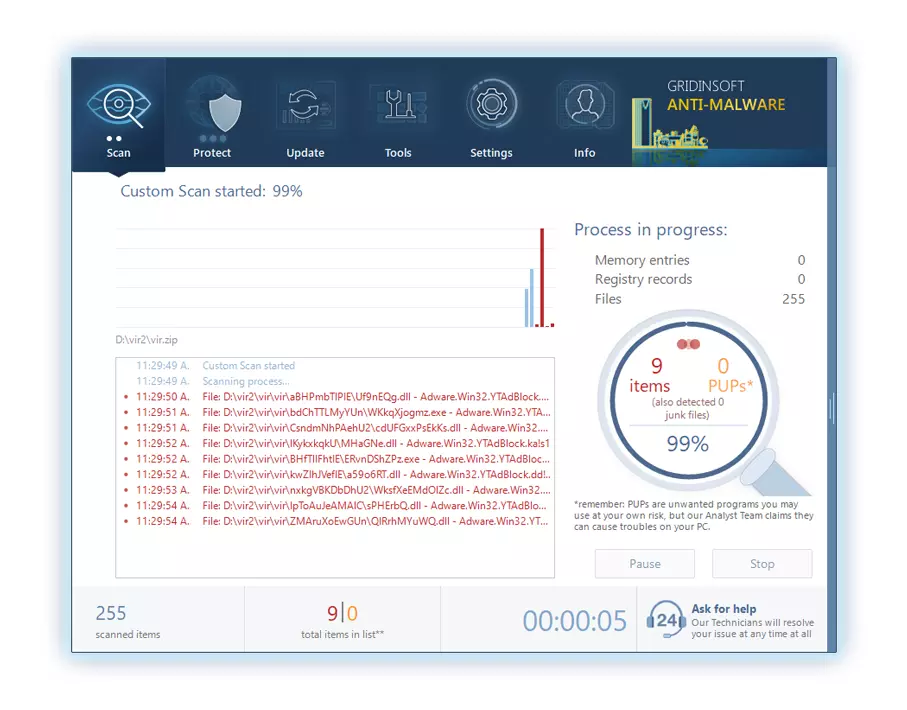
Be patient, as the scan duration depends on the number of files and your computer's hardware capabilities. Use this time to relax or attend to other tasks.
5. Upon completion, Anti-Malware will present a detailed report containing all the detected malicious items and threats on your PC.
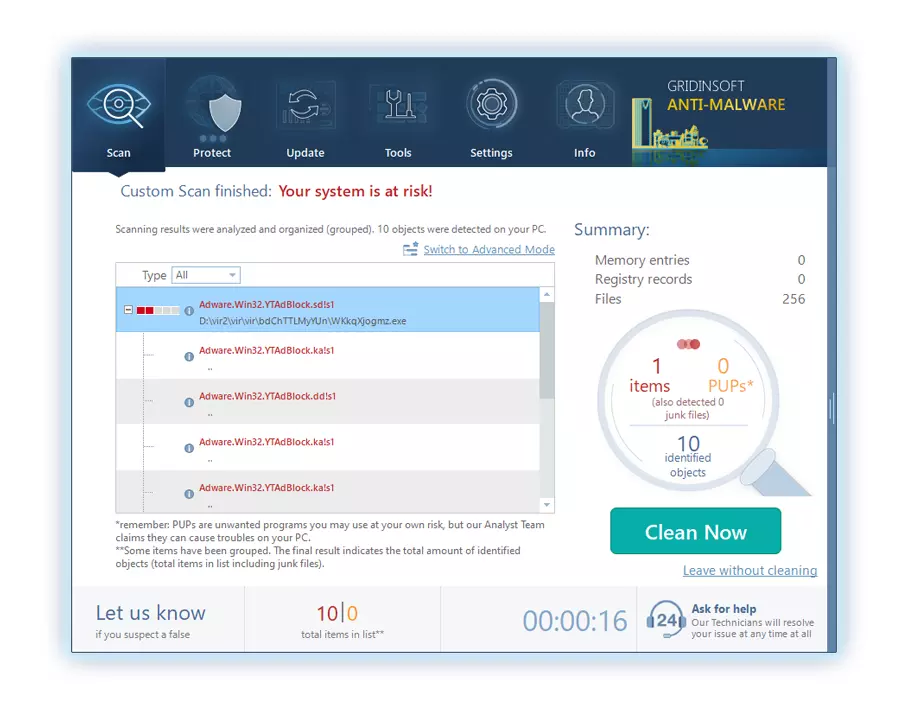
6. Select all the identified items from the report and confidently click the "Clean Now" button. This action will safely remove the malicious files from your computer, transferring them to the secure quarantine zone of the anti-malware program to prevent any further harmful actions.

8. If prompted, restart your computer to finalize the full system scan procedure. This step is crucial to ensure thorough removal of any remaining threats. After the restart, Gridinsoft Anti-Malware will open and display a message confirming the completion of the scan.
Remember Gridinsoft offers a 6-day free trial. This means you can take advantage of the trial period at no cost to experience the full benefits of the software and prevent any future malware infections on your system. Embrace this opportunity to fortify your computer's security without any financial commitment.
Frequently asked questions
The vast majority of information posted on the Coinsguru site is false. It is either fabricated, or a manipulation that misses the context of mentioned events. However, things like quotes or other interactive elements related to current prices may be trustworthy. But I would rather avoid using them as a primary source of information.
No, there is no legitimate information on the Coinsguru site. The operators of this site use fabricated details and deceptive tactics to create an appearance of credibility, such as appealing visuals and claims of being a licensed company. However, these claims are false, and the site is part of a larger network of interconnected crypto scam sites designed to defraud victims. The scammers manipulate users into providing sensitive personal information and making deposits, ultimately leading to the loss of funds.
Unfortunately, recovering funds lost to a scam like Coinsguru can be extremely challenging, if not impossible. Scammers often operate from obscure locations and use various tactics to cover their tracks, making it difficult to trace or retrieve the stolen funds. In many cases, these scams are designed to exploit victims and disappear once they have obtained the money.
Spotting crypto trading scams requires vigilance and a critical eye. Here are some tips to help you identify potential crypto trading scams in the future:
- Question Unrealistic Promises. Approach offers that promise unrealistically high returns or guaranteed profits with caution. If an investment opportunity sounds too good to be true, it probably is.
- Scrutinize Celebrity Endorsements. Exercise skepticism when encountering endorsements from celebrities or public figures. Scammers often create fabricated endorsements to enhance their credibility.
- Verify Regulation and Licensing. Investigate whether the platform or service holds proper regulation and licenses from relevant authorities. Scammers frequently operate without legitimate authorization.
- Consult Reviews and Feedback. Seek out independent reviews and feedback from other traders. Positive reviews can be falsified, but negative reviews may offer valuable insights.
- Resist Urgency. Be wary of tactics that use a false sense of urgency to rush your decisions. Legitimate investments provide the necessary time for thorough research and contemplation.
If you have become a victim of a Coinsguru or similar crypto trading scam, it’s important to take immediate action to minimize further damage and increase the chances of recovering your losses. Here’s what you should do:
- Notify Cryptocurrency Exchanges. Should you have employed a cryptocurrency exchange for transactions linked to the scam, inform the exchange about the fraudulent activity. In certain cases, they could extend their assistance.
- Contact Financial Institutions. If you conducted any payments or deposits through your credit card or bank account, promptly notify your financial institution. They might offer assistance in contesting transactions or initiating chargebacks.
- Thoroughly Document. Gather and safeguard all pertinent information, including emails, screenshots, transaction records, and any correspondence with the scammers. This documentation holds utmost importance for reporting the scam and seeking assistance.
- Immediately Halt Communication. Once you recognize that you have fallen victim to a scam, cease all communication with the scammers. Refrain from responding to their emails, messages, or phone calls.
- Seek Legal Advice. Consult with a legal professional who specializes in fraud or financial matters. They can provide advice on potential legal actions you can take to recover your funds.
- Consult Legal Counsel. Seek counsel from a legal expert specialized in fraud or financial matters. They can provide guidance on potential legal avenues for recovering your funds.
- Inform the Authorities. Lodge an official report with your local law enforcement agency and relevant regulatory bodies within your country. Present them with the amassed evidence. This step instigates investigations and enhances awareness about the scam.





